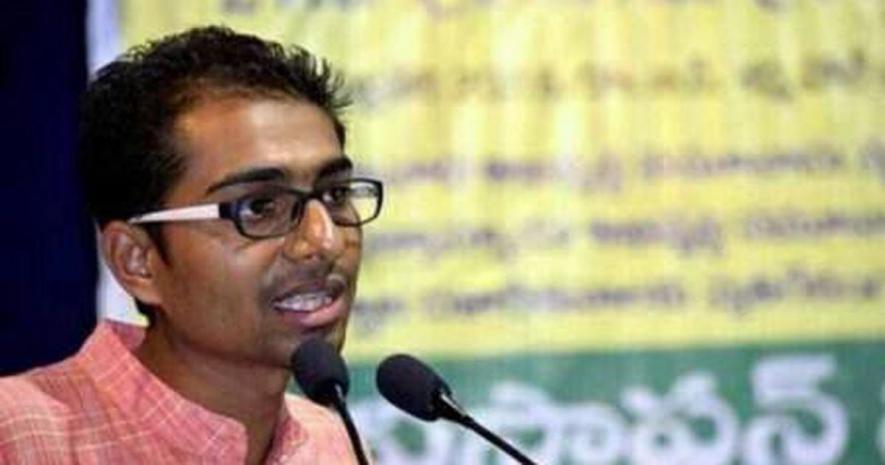The Incarceration of Mahesh Raut

Image Courtesy: Scroll.in
On March 15, 2019, I received a message from some friends saying we should soon write letters and send books for Mahesh. “He realises it will be a bit of time before he can finally get out, so he would rather read and continue work on issues and rights of Gram Sabha, than waste time”, the message said.
This group of friends have reason enough to believe Mahesh is not an ‘urban naxal’ as the charges levelled against him by the Pune police say. He is a young man raising his voice against illegal mining in Gadhchiroli, reading, understanding and deliberating for the rights of tribals and other communities in the state of Maharashtra, and in the entire country.
The message made me both happy and anxious. The fact that a 30-year old has shown so much resilience in the face of state prosecution gave me immense strength. It is encouraging that he still holds on so close to the issues he has worked around, even a year after his arrest on June 6.
Also watch: Arrest of 5 Activists Using UAPA Another Attempt to Silence Dissidents?
It was also the election season. People around me wanted to either bring a change in what was an oppressive regime, while many loved the idea of a second season of democratically elected authoritarianism. The entire exercise has polarised us sharply, and the debate for political alternatives has entirely ignored core issues of natural resources – of ownership, control, and management.
Mahesh has been a friend to many people, who have adored him, and supported him and his work. I finally wrote him a letter and sent a few books on the issues we both have been involved, hoping he will get to read these. I was not sure what I could really write to him – or if he will get to read what I had to say. I was not sure if writing a letter expressing love and gratitude to him meant I was an ‘urban naxal’ too in the eyes of the state or to the public at large. But the time to doubt oneself, or be frequently afraid, was over.
After repeated hearings for bail, the matter has been postponed several times. However, he is still hopeful about the outcome of the case.
Even before he was arrested, many raids at his house, surveillance and hounding was something that he was getting used to.
Also read: Bhima Koregaon Violence: A Year Later, A Sense of Fear is Palpable
His friends and family had known this was imminent, considering he was attempting to form a federation of Gram Sabhas – who later on rejected mining propositions, and demanded for greater control of forests by communities. In that region of Maharashtra, however, to demand things in the name of communities can invariably mean supporting the Maoist groups in the eyes of the state and intelligence agencies. The evidence is scarce, and connections drawn against citizens are outrageous. The storm against Mahesh was brewing. Bhima Koregaon was merely an excuse.
The charges under Unlawful Activities (Prevention) Act (UAPA) are draconian. It is almost impossible to get bail, and the prosecution has gone so far as to argue these people are detrimental to the national security of the country. They merely read and write, and organise peaceful processions. Who is really threatened by that, exactly?
In a context where many people are already being called ‘anti-nationals’ or ‘agents of anti-development brigade’, I am not sure if the prosecution of Mahesh, or of Sudha didi (activist Sudha Bhardwaj) who has given her life’s work to the cause of tribals means anything to the people at large. The case against Surendra Gadling – a noted human rights lawyer – has been to destroy the base of legal recourse available to the people at the margins, for those who have constantly suffered from the nexus of the corporate groups – like Jindal, Vedanta, or Adani – with the state and central departments.
Today, environmental clearances to mining projects are doled out without understanding the actual need, without accurate assessment made of the loss of forests, and of the millions of people depending for their lives and livelihoods, putting numerous animals and birds on the verge of extinction and without worries of changing rain cycles. While ‘climate change’ remains an unclear enemy, the agents causing further distress to people are neither punished, nor any punitive action is taken by those in charge. The case of Hasdeo Aranya, a bio-diverse rich region in North Chhattisgarh is a point in question, where thousands of hectares have been leased out to Adani group to mine coal. It is a disaster which has sanction from all quarters. But the people there are fighting it, and doing it without fear. They know the law is on their side, and there is no other way than to fight it out.
Also read: Changes to Indian Forests Act: How Modi is Trying to Subvert FRA
On the other hand, to talk of equality is supposedly the past-time of ‘left-leaning intellectuals’ or of misguided people who do not realise that this is how development works. There is no method to this madness any more. The recent proposed amendments to the Indian Forest Act, 1927, has been severely criticised by activists, environment experts, tribal groups, and statutory bodies. Still, they will go through this next session of Parliament and also be passed, irrespective of these protests.
Traditional knowledge on the conservation of forests is being dominated by the bureaucracy and the forest department. Resources to the tune of Rs 80,000 crore are being transferred to forest department in the name of Compensatory Afforestation. There is no difference in the colonial mindsets of the British and those who took over from them. It took years of struggle to even get the minimum rights recognised in the Constitution – like the legislations of Forest Rights Act, 2006, or the 73rd and 74th amendments which give powers to Gram Sabhas in Schedule V and Schedule VI areas to determine all paradigms of growth and development.
Mahesh in not the only one who was working with these goals. Many before him, and many after him have tried to get the state to perform its roles – while the governments have been successful in putting people like them behind bars.
But you cannot kill ideas – not at gunpoint, not with the fear of prosecution. Activists will continue to lend their voice to those who have been deliberately silenced. The psychosis of fear will be defeated eventually. And those who want to preserve democracy will come out of jails and fill the streets. Radical hope is all we have for now. The question is, can we work to build it for us?
The writer is working with the Society for Rural, Urban and Tribal Initiative (SRUTI) and is based in New Delhi. The views expressed are personal.
Get the latest reports & analysis with people's perspective on Protests, movements & deep analytical videos, discussions of the current affairs in your Telegram app. Subscribe to NewsClick's Telegram channel & get Real-Time updates on stories, as they get published on our website.
























